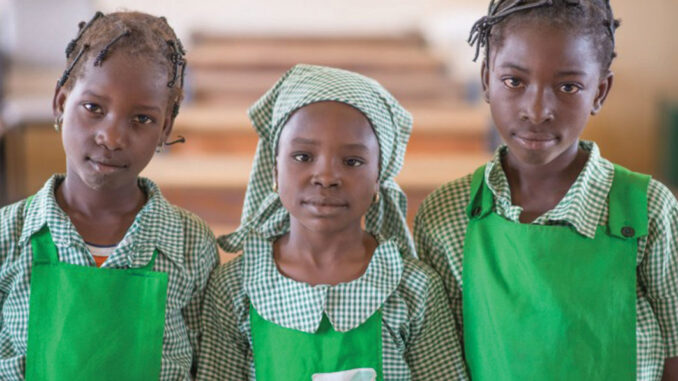
The truth collided with reality over concerns militating against the girl-child, it raised the discussion of the continued abuse, violence and relegation of women to the background. The outrage that greeted the girl-child issue was viewed narrowly or broadly as the case may be. From a narrow perspective, customs and tradition are seen as tools used to limit the prospect of the girl-child through denial of education by engaging girls in early marriage among others. More broadly is the inability of the world to take a definite stand, speak with one voice and fight the menace in unison in order to liberate the girl-child wherever they are, from her disadvantage position.
Therefore, the other day, as the world came together to commemorate the International Day of the Girl-Child (IDGC), advocates in Nigeria lamented that there is little to celebrate as the country ranks bottom six globally in child welfare and bottom 10 for girls flourishing. Of course, one is not surprised by Nigeria’s child rights activists’ lamentations. This is because, majority of the International conferences or days set-aside to commemorate an event are held as a matter of routine without any concrete actions to give meaning to high-minded resolutions. Hence, the issues will not go away and the girl-child challenges have become a recurrent decimal and subject of debate for decades unending.
In most cases, depending on the political winds, especially in third world countries, the girl-child challenges resonate with silken words that seem the issue would be tackled out-rightly with desired result achieved in no time. The fashioned regulative apparatus and high powered international bodies involved in tackling the girl-child issues, is tempting to think that the ugly acts of systemic violence, abuse and neglect against the girl-child is behind us in the 21st Century. That we are once again in the season of reminding ourselves about certain cultural and traditional beliefs concerning the girl-child that remain unbroken in some societies is not only disturbing but shameful. More so, the rhetoric that accompanies the IDGC ceremony and cases of girl-child abuse and molestations across the world makes it obvious how deeply entrenched society has been romancing the issue without a firm stand to stop the menace.
In Nigeria for instance, the secretary, Lagos state Domestic and Sexual Violence Response Agency, Titilola Vivour-Adeniyi said about 2,146 girls have suffered abuse in the last two years while approximately 300 suffered defilement and rape. To cap the above, in a report, the United Nations Children Education Fund (UNICEF) noted that abuse in all its forms is a daily reality for many Nigerian children and only a fraction ever receive help. Also, that Nigeria has the largest number of child brides in Africa with more than 23 million girls and women married off as children from poor and rural communities.
The unimaginable inequality and danger that accost the girl-child in Nigeria today have risen to an alarming proportion. The statistics as mentioned above, are, of course, warped depending on cases reported to the agency or who is on the podium. It is high time the government grasps the danger associated to child marriage as one notable factor that slows down the progress and development of the nation. Indeed, it is disheartening to hear some underlying assumptions among the masses that it is a waste of time and money to educate the girl-child. Indeed, one thing that never ceases to amaze me is the psychology of the poor masses and it is not just unfortunate but an intolerable invention.
Both the policy-makers in government and those who share the above view should wake up from slumber and tackle the noxious practice against the girl-child. Indeed, it is striking to read a report in an edition of The Economist, magazine that nations that fail women end up as failed nations. While those that place the required premium on educating women have recorded numerous technological advancement and pushed back their economic frontiers. An example is not farfetched as our nation, Nigeria is a witness in its woeful failure on women affairs and its tilting towards a failed state. Of course, the Beijing conference in 1995 set out to reshape the position of women in the society, after what seems like ageless wisdom to continue keeping women on the background.
Today, it is disheartening that the girl-child continues to suffer policy abandonment, social and cultural prejudices in some regions and communities in Nigeria. Regrettably, in some other place across the world, the girl-child is not given the opportunity to be born as girls are selectively aborted, a situation that has led to skewed sex ratio, and millions of young men seem doomed to remain single. Therefore, frustrated young men are more susceptible to commit violent crimes or join rebel groups.
Clearly, the girl-child has suffered enough and until concrete action is taken by the world for high minded resolutions, the ugly issues affecting the girl-child will continue to smear at us in the face. Therefore, the question of having the Violence Against Persons (Prohibition) Act 2015; which provides a legislative and legal framework for the provision of all forms of violence against persons, particularly women and girls and the Child Rights Act (2003), that guarantees the rights of all children in Nigeria among others. Yet, some parents still give out their underage girl-child in marriage or cynical approach and subterfuges of certain culture or tradition expressed in the society in such notions that deprive the girl-child still exist, is shameful.
The government must be seen to walk its talk and make the laws bite by criminalising the offences against the girl-child. In the same breath, it behooves on every citizen to play his/her part in the progress and development of the girl-child for a better and safe society.
END

Be the first to comment